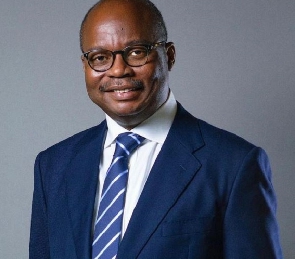 BoG Governor, Dr. Ernest Addison
BoG Governor, Dr. Ernest Addison
Banks in the country have demonstrated their commitment to incorporating comprehensive Environmental, Social and Governance (ESG) principles into their operational frameworks, the Head of Banking Supervision at the Bank of Ghana (BoG), Osei Gyasi, has stated.
In keynote remarks at the 26th National Banking Conference, where he was representing the Governor – Dr. Ernest Addison, Mr. Gyasi disclosed that all 23 universal banks have this year completed and submitted a template developed by the regulator in addition to its Sustainable Banking Principles and Sector Guidance Notes, to enable banks accelerate their ESG-compliance journey.
He said it marks an improvement on the number presented in September last year, and believes the development bodes well for the industry and wider economy’s long-term sustainability.
“As part of the efforts to promote sustainable banking, the BoG issued a monitoring guidance and reporting template to be completed by banks – which is used in monitoring levels of implementation for the principles and guidance notes. This self-assessment guide is meant to serve as a checklist that guides banks to take the necessary steps in developing the appropriate sustainable policies and procedures,” he explained at the conference, which had as its theme ‘The Future of Banking in Ghana: Ethics, Professionalism and ESG Imperatives’.
“In terms of compliance, reports submitted recently indicate that all 23 banks have completed and submitted the template; an improvement compared with the submission made in September 2021,” Mr. Gyasi added at the event organised by the Chartered Institute of Bankers (CIB).
His submission was consistent with the outcome of PwC’s 2022 Ghana Banking Survey Report – which surveyed 21 out of the 23 registered universal banks and found that 62 percent of the bank executives it surveyed confirmed the existence of plans to incorporate dedicated ESG principles in the near-term.
With ESG issues guaranteed to colour the banking landscape’s future – as evidenced by projections that the value of global ESG-leaning institutional investment will soar by 84 percent to US$33.9trillion in 2026 from US$18.9trillion in 2021 – the BoG’s representative said domestic banks must double down on their efforts to attract sustainable investments.
“Investors are now concerned about ESG performance and how they are reported, especially the impact of ESG on the balance of banks… Data compilation and analysis of ESG activities have become imperative in this rapidly evolving industry,” he said, adding that banks will prove critical in bridging the financing gap required for the Sustainable Development Goals (SDGs) and net-zero commitments to be met in a respectable time.
While there is heightened focus on the environmental and social aspects, Mr. Gyasi said recent developments in the nation’s financial landscape prove that significant emphasis must be placed on corporate governance.
He thus charged stakeholders in the industry not to treat guidelines and directives as mere checklists, but ensure that they are implemented as intended.
“The business of banking is evolving rapidly, hence there’s a need to be intentional in strict adherence to individual codes of ethics and professionalism; as well as the CIB and GAB’s code of ethics and banking practice in our various banks,” he added.
On his part, Chief Executive Officer at CIB, Robert Dzato, said with the risks and opportunities ESG presents to banks, the institute – as the foremost trainer of bankers – has begun an extensive programme to ensure bankers are well-equipped in this regard.
“Our role at CIB is to educate, and currently we are running a programme in partnership with the International Finance Corporation (IFC) to train bankers in ESG,” he said, while affirming that ethics and professionalism will be permanent features of the programme.
Chairman for the occasion and CEO of the Ghana Association of Banks, John Awuah, said banks will continue to comply with the prevailing sustainable banking regulatory provisions as well as lead conversations around the subject while driving innovation.